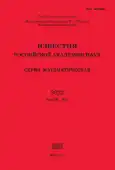Vol 86, No 5 (2022)
- Year: 2022
- Articles: 10
- URL: https://bakhtiniada.ru/1607-0046/issue/view/7558
Articles
Sergey Petrovich Konovalov (congratulation)
Izvestiya Rossiiskoi Akademii Nauk. Seriya Matematicheskaya. 2022;86(5):3-4
 3-4
3-4


Estimates for the integrals of derivatives of rational functions in multiply connecteddomains in the plane
Abstract
We obtain estimates for the integrals of derivatives of rational functions inmultiply connected domains in the plane.A sharp order of growth is found for the integral of the modulus of thederivative of a finite Blaschke product in the unit disc.We also extend the results of Dolzhenko about the integrals of thederivatives of rational functions to a wider class of domains, namely, todomains bounded by rectifiable curves without zero interior angles, and showthe sharpness of the results obtained.
Izvestiya Rossiiskoi Akademii Nauk. Seriya Matematicheskaya. 2022;86(5):5-17
 5-17
5-17


Modification of Poincare'sconstruction and its application in $CR$-geometry of hypersurfaces in $\mathbf{C}^4$
Abstract
The modified Poincare construction (a generalization of Poincare's homological operator)was earlier used to estimate the dimension of the local automorphism group for an arbitrary germof a real-analytic hypersurface in $\mathbf{C}^3$. In the present paper we prove the followingalternative. For every hypersurface in $\mathbf{C}^4$, this dimension is either infinite or doesnot exceed $24$. Moreover, $24$ occurs only for a non-degenerate hyperquadric(one of the two). If the hypersurface is $2$-nondegenerate (resp. $3$-non-degenerate)at a generic point, the bound can be improved to $17$ (resp. $20$).
Izvestiya Rossiiskoi Akademii Nauk. Seriya Matematicheskaya. 2022;86(5):18-42
 18-42
18-42


On classification of Morse–Smale flows on projective-like manifolds
Abstract
In this paper, the problem of topological classification of gradient-like flows without heteroclinic intersections, given on a four-dimensional projective-like manifold, is solved. We show that a complete topological invariant for such flows is a bi-color graph that describes the mutual arrangement of closures of three-dimensional invariant manifolds of saddle equilibrium states. The problem of construction of a canonical representative in each topological equivalence class is solved.
Izvestiya Rossiiskoi Akademii Nauk. Seriya Matematicheskaya. 2022;86(5):43-72
 43-72
43-72


 73-96
73-96


On solvability of semilinear second-order elliptic equations on closed manifolds
Abstract
The paper is concerned with solvability in the class of weak solutions of one class ofsemilinear elliptic second-order differential equationson arbitrary closed manifolds. These equations are inhomogeneous analoguesof the stationary Kolmogorov–Petrovskii–Piskunov–Fisher equation, andhave great applied and mathematical value.
Izvestiya Rossiiskoi Akademii Nauk. Seriya Matematicheskaya. 2022;86(5):97-115
 97-115
97-115


Evolutionary force billiards
Abstract
A new class of integrable billiards has been introduced: evolutionary force billiards. They depend on a parameter and change their topology as energy (time) increases. It has been proved that they realize some important integrable systems with two degrees of freedom on the entire symplectic four-dimensional phase manifold at a time, rather than on only individual isoenergy 3-surfaces. For instance, this occurs in the Euler and Lagrange cases. It has also been proved that these two well-known systems are “billiard-equivalent”, despite the fact that the former one is square integrable, and the latter one allows a linear integral.
Izvestiya Rossiiskoi Akademii Nauk. Seriya Matematicheskaya. 2022;86(5):116-156
 116-156
116-156


On summable solutions of a class of nonlinear integral equations on the whole line
Abstract
In this paper, we study a class of nonlinear integral equationswith a noncompact monotone Hammerstein–Nemytskii operator onthe whole real line. This class of equations is widely usedin various fields of natural science. In particular, such equationsarise in mathematical biology and in the theory of radiative transfer.A constructive existence theorem for a nonnegativenontrivial summable and bounded solution is proved. We also study the asymptotic behavior of the solution at $\pm\infty$. At the end of the paper,specific examples of the indicated equations are given, that satisfy all theconditions of the proved existence theorem. In an important particular case, it is possible to prove a uniqueness theorem in a certainclass of essentially bounded functions.
Izvestiya Rossiiskoi Akademii Nauk. Seriya Matematicheskaya. 2022;86(5):157-168
 157-168
157-168


 169-196
169-196


One advance in the proof of the conjecture on meromorphic solutions of Briot–Bouquet type equations
Abstract
We study entire solutions (solutions which are entire functions) of differential equations of the form$P(y,y^{(n)})=0$, where $P$ is a polynomial with complex coefficients, $n$ is a natural number.We show that, under some constraints on $P$, all entire solutions of such equations are eitherpolynomials, or functions of the form $e^{-L\beta z}Q(e^{\beta z})$, where $L$ is a nonnegative integer, $\beta$ isa complex number, and $Q$ is a polynomial with complex coefficients.This verifies the well-known A. E. Eremenko's conjecture on meromorphic solutions of autonomousBriot–Bouquet type equations for entire solutions in the nondegenerate case.
Izvestiya Rossiiskoi Akademii Nauk. Seriya Matematicheskaya. 2022;86(5):197-208
 197-208
197-208










